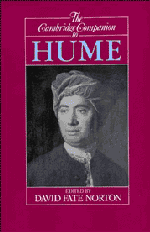Book contents
- Frontmatter
- 1 An introduction to Hume's thought
- 2 Hume's new science of the mind
- 3 Hume and the philosophy of science
- 4 Hume's scepticism
- 5 Hume's moral psychology
- 6 Hume, human nature, and the foundations of morality
- 7 The structure of Hume's political theory
- 8 David Hume: Principles of political economy
- 9 Hume's literary and aesthetic theory
- 10 David Hume, "the historian"
- 11 Hume on religion
- Appendix: Hume's autobiographies
- Bibliography
- Index of Names and Subjects
- Index of Citations and References
3 - Hume and the philosophy of science
Published online by Cambridge University Press: 28 May 2006
- Frontmatter
- 1 An introduction to Hume's thought
- 2 Hume's new science of the mind
- 3 Hume and the philosophy of science
- 4 Hume's scepticism
- 5 Hume's moral psychology
- 6 Hume, human nature, and the foundations of morality
- 7 The structure of Hume's political theory
- 8 David Hume: Principles of political economy
- 9 Hume's literary and aesthetic theory
- 10 David Hume, "the historian"
- 11 Hume on religion
- Appendix: Hume's autobiographies
- Bibliography
- Index of Names and Subjects
- Index of Citations and References
Summary
Among all the philosophers who wrote before the twentieth century none is more important for the philosophy of science than David Hume. This is because Hume is widely recognized to have been the chief philosophical inspiration of the most important twentieth century school in the philosophy of science - the so-called logical positivists. These philosophers began to work in Vienna in the late twenties, but by the end of the Second World War most of them had come to the United States. Many of them preferred the name logical empiricists, in part to emphasize their greater debt to Hume than to Comte. They recognized that Hume raised a variety of issues that set the agenda for their program in the philosophy of science. It is jointly because of his impact on this agenda and because of the influence the philosophy of science acquired over this period that, after the First World War, Hume came to be regarded as the most important philosopher to have written in the English language.
Hume's knowledge of the science of his time is a matter of some controversy. Although in the Treatise he announced that he intended to bring "the experimental method of reasoning" to moral subjects, substantive science plays only a small role in Hume's writings, and there is little discussion of issues raised by Newtonian mechanics, the focus of much work in the philosophy of science in the twentieth century. As Noxon says, the Treatise "is as unmathematical as Ovid's Metamorphoses." Yet there seems ample evidence to suppose that Hume's philosophy was animated by his interpretation of Newton's substantive and methodological views, as well as those of Hooke and Boyle.
- Type
- Chapter
- Information
- The Cambridge Companion to Hume , pp. 64 - 89Publisher: Cambridge University PressPrint publication year: 1993
- 33
- Cited by

